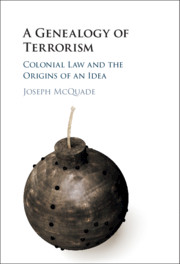Book contents
- A Genealogy of Terrorism
- A Genealogy of Terrorism
- Copyright page
- Dedication
- Epigraph
- Contents
- Figures
- Acknowledgements
- Abbreviations
- Introduction
- 1 Ethereal Assassins
- 2 ‘The Magical Lore of Bengal’
- 3 ‘The Eye of Government Is on Them’
- 4 Indefinite Emergency
- 5 Terrorism as a ‘World Crime’
- Conclusion
- Glossary
- Select Bibliography
- Index
3 - ‘The Eye of Government Is on Them’
Anti-Colonialism and Emergency during the First World War
Published online by Cambridge University Press: 30 October 2020
- A Genealogy of Terrorism
- A Genealogy of Terrorism
- Copyright page
- Dedication
- Epigraph
- Contents
- Figures
- Acknowledgements
- Abbreviations
- Introduction
- 1 Ethereal Assassins
- 2 ‘The Magical Lore of Bengal’
- 3 ‘The Eye of Government Is on Them’
- 4 Indefinite Emergency
- 5 Terrorism as a ‘World Crime’
- Conclusion
- Glossary
- Select Bibliography
- Index
Summary
In 1914, the Government of India passed the Ingress into India Ordinance in an attempt to limit the transgressive potential of Ghadar propaganda and transnational revolutionary networks based out of North America and parts of East and South East Asia. The following year, the passage of the Defence of India Act sought to target revolutionaries whom the government deemed to be either in league with Germany, or whose acts of anti-colonial violence aided and assisted the German war effort. Following the conclusion of the war in 1918, colonial officials issued the controversial Rowlatt Act, despite the disapproval of an increasingly vocal Indian public. By tracing the debates and discussions surrounding the passage of these three pieces of 'emergency' legislation, this chapter demonstrates how executive discourses sought to construct and deploy distinct notions of 'the enemy' as a means of legitimizing extraordinary laws meant to target the political challenge of anti-colonial nationalism.
Keywords
- Type
- Chapter
- Information
- A Genealogy of TerrorismColonial Law and the Origins of an Idea, pp. 125 - 162Publisher: Cambridge University PressPrint publication year: 2020

